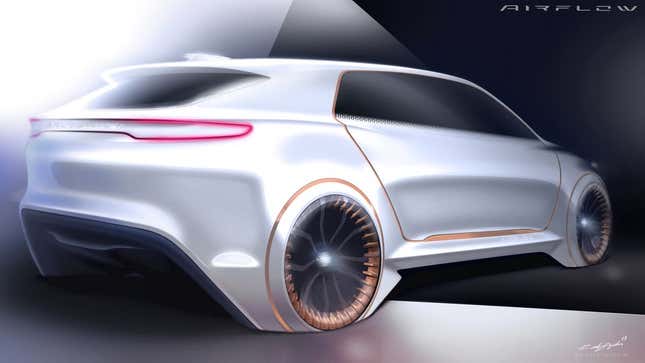
Back in 1934, Chrysler debuted the Airflow. The car was a revolution in that it brought wind-tunnel testing from the world of aviation to the car market. More than 85 years later, the name is back on a concept from FCA that will debut at CES this week.
The original Airflow represented a major shift not only in the way the exterior of a car was designed but also how occupants interacted with the car. Low entry height and a rear seating position forward of the rear axle gave a sensation of riding within the car rather than on top of it.
Now, Chrysler is invoking the Airflow again with the 2020 Airflow Vision concept. Not so much a direct preview of Chryslers to come, the Airflow Vision is designed to show off the kind of work Fiat Chrysler is putting into the user experience of drivers and passengers, which makes a lot of sense at CES, the show where automakers have long attempted to define their relationship with the consumer electronics field.

In this case, Fiat Crysler is particularly interested in exploring the way vehicle occupants interact with the media and information suite that dominates the dash of most cars:
Inside, UX plays a prominent role and is designed to be a captivating experience using multi-layered, high-contrast graphics and thoughtful details that provide a clean, sophisticated appearance. Built on the principles of depth, hierarchy, consistency and legibility, the user will be able to see and experience the interface in a way that is safe, easy to use and understand.
Using a menu-based format, screens can be personalized, simplified and grouped to individual needs and interests. Offering multiple display screens, the user can access needed information and determine how it’s displayed. Information on the screens can be shared with all passengers by swiping, allowing each passenger to participate in the experience. Customization and personalization are key, whether driving or acting as a co-pilot.

Underneath, the Airflow Vision uses the drivetrain and platform from the Pacifica PHEV, hammering home the idea that this car is more than anything a way to keep
This concept comes not long after Fiat Chrysler invested considerable resources in a facility in Brazil designed to allow designers to better test the way drivers interact with their vehicles. It’s not clear whether this car was developed there, but a renewed focus on ergonomics would be welcome in Fiat Chrysler’s models, where recent attempts such as the uconnect system have left much to be desired.
Interestingly, though this car is branded the Airflow, it isn’t clearly branded a Chrysler too (or a De Soto for that matter). The taillights have a distinct Dodge look to them, forming a closed look stretched out at the bottom corners like the lights on the current Charger, but besides that, the car is devoid of much brand DNA.

As Fiat Chrysler inches closer to its merger with PSA, it remains unclear what role the Chryser brand will play. This concept seems to suggest that distinctions between the North American set of FCA brands (Jeep aside) will continue to blur. Of course, that’s nothing new from Chrysler, which used to slap a Pentastar on every product they made, but it’s a far cry from what we had envisioned.
Along with the Airflow Vision, FCA is bringing a set of EV Jeep concepts and a Fiat small car concept to CES this year. The focus of all of the concepts is unsurprisingly electrification and user experience and we look forward to sharing some more about those as the show opens.